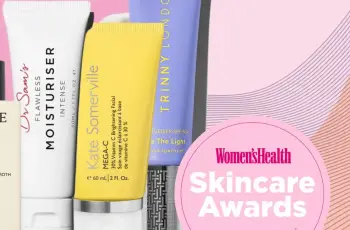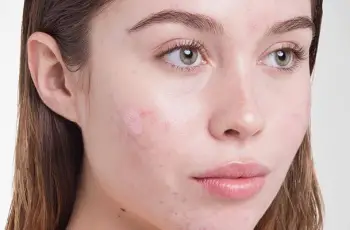
Chapped Lips vs. Cold Sores: How to Know What You’re Dealing With
Lips are a prominent and unique facial feature that people love to highlight, but they’re also a source of skin problems, especially during the cold, dry months when lips can easily become dry, chapped, cracked, and painful.
Other lip problems include cold sores, which are caused by a virus and can be painful. Sometimes it can be hard to tell the difference between chapped lips and cold sores, but knowing what you’re dealing with is crucial to treatment.
Below, learn how to tell the difference between cold sores and chapped lips, and how to treat both conditions, according to dermatologists.
What is chapped lips?
Chapped lips are when your lips become flaky, cracked, and inflamed. The tissue that makes up your lips is similar to a mucous membrane, like the ones in your nose and mouth, but they have an ultra-thin layer of skin.
The problem is that this skin lacks the protective features of normal skin, making it very susceptible to dryness and irritation.
“Lips are very susceptible to drying out because they don’t have sebaceous glands and hair follicles, and therefore don’t have the protective layer of sebum that the rest of our normal, hairy skin has,” explains Dr. Kristina Collins, double-board certified dermatologist and founder of foy by Dr. Collins.
They also have a very thin stratum corneum, or outermost layer, compared to the rest of our skin, according to Collins.
The stratum corneum is a protective layer of dead skin cells on the outer part of the epidermis that performs an important function in the skin to keep things in and out. In other words, it seals off the inside of our bodies from the outside world and prevents moisture from escaping our bodies.
“Because our lips are so sensitive, it’s hard for them to retain moisture. Because of this natural sensitivity to dryness, factors that contribute to overall dry skin, such as cold weather, low humidity, dehydration, or poor skin care, tend to affect the lips first,” Collins explains.
There are also specific causes of dry lips, Collins says, including lip licking, frequent kissing, allergic reactions or sensitivities to oral care products or foods, saliva irritation, vitamin deficiencies (including iron, zinc, or vitamin B12), chronic mouth breathing due to nasal congestion, and in severe cases, certain autoimmune diseases, such as Sjögren’s syndrome.
“In addition, sun damage, both in the direct sense of sunburn, as well as longer-term sun-related changes that can lead to actinic cheilitis, is one of the most common causes of dry lips,” Collins adds.
To complicate matters further, many lip balms and lip balms used to treat dry lips actually make the problem worse due to the irritating ingredients that are often added. 1
What is a cold sore?
A cold sore is the common name for a herpes outbreak on the lips. 2 “Cold sores are most commonly caused by HSV type 1, which is inactive in most adults,” explains Collins.
Less commonly, she adds, oral cold sores can be caused by HSV type 2, the herpes virus more commonly associated with genital herpes infections.
The herpes virus lives dormant in parts of the nervous system called sensory ganglia and, when reactivated, crawls along the nervous system to the skin.
2 “This reactivation process can occur randomly or can be triggered by stress, UV radiation, hormones, menstruation, or trauma to the skin,” says Collins. Chapped lips vs. cold sores
While both chapped lips and cold sores can be irritating and painful, cold sores can cause more severe pain. “Perhaps the biggest difference between chapped lips and cold sores is the paroxysmal and deep nerve pain that cold sores can cause,” explains Dr. Rachael Cayce, board-certified dermatologist and member of the Physician Formula Alliance.
While cold sores are caused by a virus, they can also be caused by the same conditions that cause chapped lips. “Dry lips can lead to cold sores, as can anything that irritates the lips, such as cold weather, excessive sun exposure, and even dental and cosmetic procedures,” Cayce adds.
One distinguishing feature is that chapped lips may flake over in large areas, and the surrounding skin may appear red but not ulcerated, Collins says. “Cold sores often recur over and over in the same area of the lip.
A typical cold sore occurs on one side of the lip, along the junction between the pink part of the lip and the skin,” Collins explains. ” She adds that cold sores are painful and may cause symptoms such as pain, numbness, or tingling before an outbreak.
Treatment
One of the main differences between chapped lips and cold sores is how the two conditions are treated. While some chapped lips treatments may help relieve the side effects of cold sores, they don’t address the underlying problem. Here are some treatment options for both.
How to Treat Chapped Lips
“Treating chapped lips starts with figuring out the cause. However, if it is due to dry skin, a thick lip balm is the best treatment,” says Casey. Thick, moisturizing lip products can protect sensitive skin from dryness.
If irritation occurs, Casey recommends avoiding irritants and even allergens that may be found in dental and cosmetic products. This may require trial and error on your part to determine the culprit.
But Collins emphasizes that there are many ways to combat dry lips, and lip balm is not the only option. Collins recommends the following:
Stay hydrated and nourished by drinking water and eating a balanced diet.
Lips often become dry overnight. Therefore, using a humidifier by your bed can treat nasal congestion and prevent mouth breathing.
When outdoors, apply SPF sunscreen to your lips every three hours to keep this sensitive area well cared for.
Proactively counteract your lips’ natural tendency to overdry by using skin care products that are truly hydrating and protective. Proactively moisturizing your lips is especially important during the winter months, in dry climates, or during activities that typically dry out your skin (hello, ski season!).
Avoid common triggers of irritant lip dermatitis, including lip products containing fragrance, lanolin, phenol, salicylic acid, or menthol. These balms can exacerbate irritation and lead to an endless cycle of peeling.
Treatment of Cold Sores
Dr. Collins says cold sores are best treated with prescription antiviral medications like valacyclovir. “Your doctor can give you a prescription to carry with you and take at the first sign of an outbreak.
The faster you take the medication, the less likely it is that a cold sore will develop into a full-blown outbreak,” she adds. If you develop many cold sores each year, your doctor may recommend chronic suppressive antiviral therapy for prevention.
Some people also use holistic treatments, such as L-lysine supplements, but it’s best to consult your doctor first.
Dr. Casey emphasizes that while cold sores can heal on their own, they can be extremely painful, which is why it’s not recommended. Instead, she recommends taking antiviral medication and avoiding contact or spreading the virus through kissing or sharing food or drinks.
Final Insights
Cracked lips and cold sores are no fun and can cause pain and irritation. Understanding your problem is crucial for the best treatment, as cold sores require medication to treat the viral nature of the disease.
Chapped lips can be treated at home, but make sure you know the cause, find the right products, and don’t make the situation worse. If you’re not sure whether you have chapped lips or a cold sore, see your doctor.


